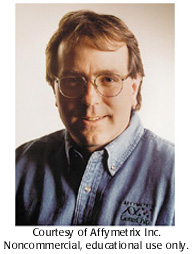Concept 36 Different genes are active in different kinds of cells.



 Igor Dawid and Tom Sargent did some of the first differential gene expression studies using cDNA subtraction. Pat Brown and Steve Fodor have changed the way genomes can be screened with DNA arrays and GeneChips®
Igor Dawid and Tom Sargent did some of the first differential gene expression studies using cDNA subtraction. Pat Brown and Steve Fodor have changed the way genomes can be screened with DNA arrays and GeneChips®
Stephen P. A. Fodor (1953-)

Steve Fodor was born in Seattle, Washington. His father was a physician and Fodor didn't plan on going to college because it was what people expected him to do. Instead he spent time working on a potato farm and indulging in one of his favorite pasttime - fly-fishing.
Fodor did finally go to college. He graduated from Washington State University with a B.S. in Biology. After this degree, he stayed at WSU and received a M.S. in Biochemistry. Fodor then went to Princeton and in 1985 received his Ph.D. in Chemistry. Throughout his undergraduate and graduate career, Fodor was known to have "hands." He was able to tweak techniques so that things worked.
Fodor did post-doctorate work at the University of California, Berkeley, and it was there in 1989 that he was recruited to Affymax Research Institute in Palo Alto. He was put in charge of developing a process to generate miniature high-density arrays of biological compounds. This led to the development of the first DNA GeneChip®, and the techniques to read and analyze these chips for large-scale genomic studies. The process has undergone a lot of refinement since the early days and the publication of the seminal paper Light-directed, Spatially Addressable Parallel Chemical Synthesis -- the first look at high-density microarray technology and combinatorial chemistry in the 1991 February issue of Science. He and his colleagues received the AAAS' 1992 Newcomb Cleveland Award for this work. Now the genomes of entire organisms like yeast are being put on a GeneChip® for analyses. The success of the GeneChip® also led Affymax to spin off another company, Affymetrix Inc., in 1993 to focus on GeneChip® production and analysis.
Fodor is Founder and Chairman of Affymetrix Inc. He has won numerous awards for his work on and the development of GeneChip® including the 2002 Takeda Foundation Award, the 2002 Economist Innovation Award for Nanotechnology, and the 2002 Oxford Bioscience Award. Fodor has also served on the Board of Directors for Sunesis Pharmaceuticals, Inc., Perlegen, Inc., and on the Board of Trustees of the Carnegie Institute of Washington.


GeneChip® technology is sensitive enough to detect single base pair differences, though the hybridization conditions must be ideal.

A-T pairs have two hydrogen bonds and G-C pairs have three. How would this affect the binding of DNA onto GeneChip® especially if the single nucleotide difference is an A to a G?
 DNA is packaged in a chromosome.
DNA is packaged in a chromosome. Higher cells incorporate an ancient chromosome.
Higher cells incorporate an ancient chromosome. Some DNA does not encode protein.
Some DNA does not encode protein. Some DNA can jump.
Some DNA can jump. Genes can be turned on and off.
Genes can be turned on and off. Genes can be moved between species.
Genes can be moved between species. DNA responds to signals from outside the cell.
DNA responds to signals from outside the cell. Different genes are active in different kinds of cells.
Different genes are active in different kinds of cells. Master genes control basic body plans.
Master genes control basic body plans. Development balances cell growth and death.
Development balances cell growth and death. A genome is an entire set of genes.
A genome is an entire set of genes. Living things share common genes.
Living things share common genes. DNA is only the beginning for understanding the human genome.
DNA is only the beginning for understanding the human genome.